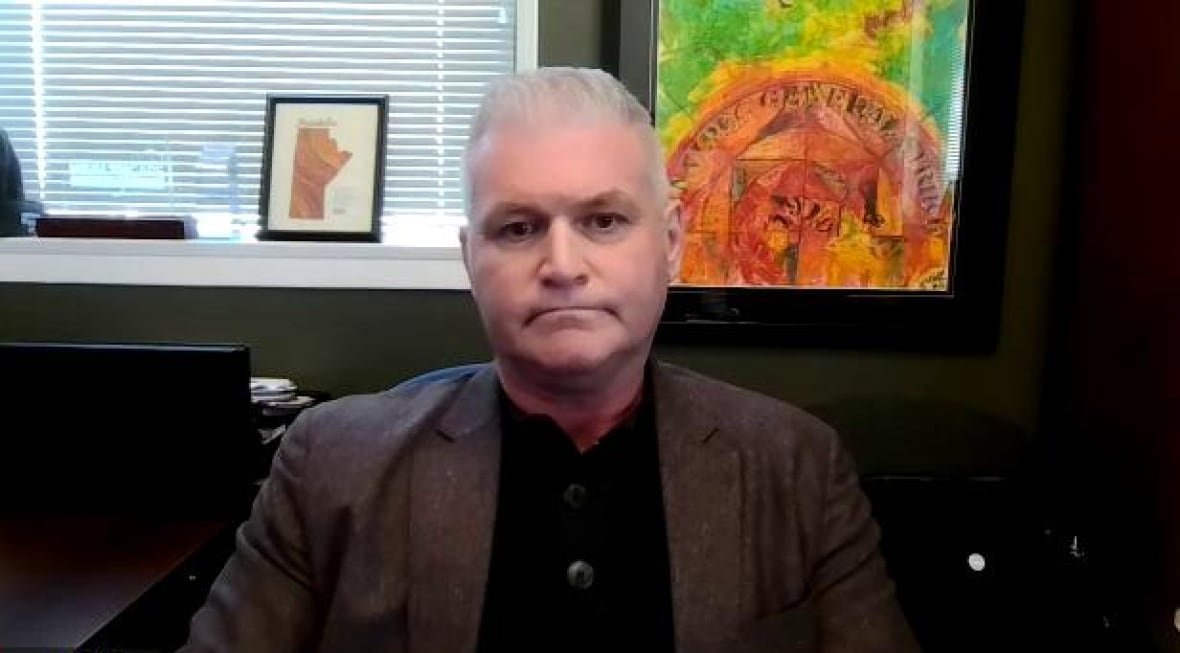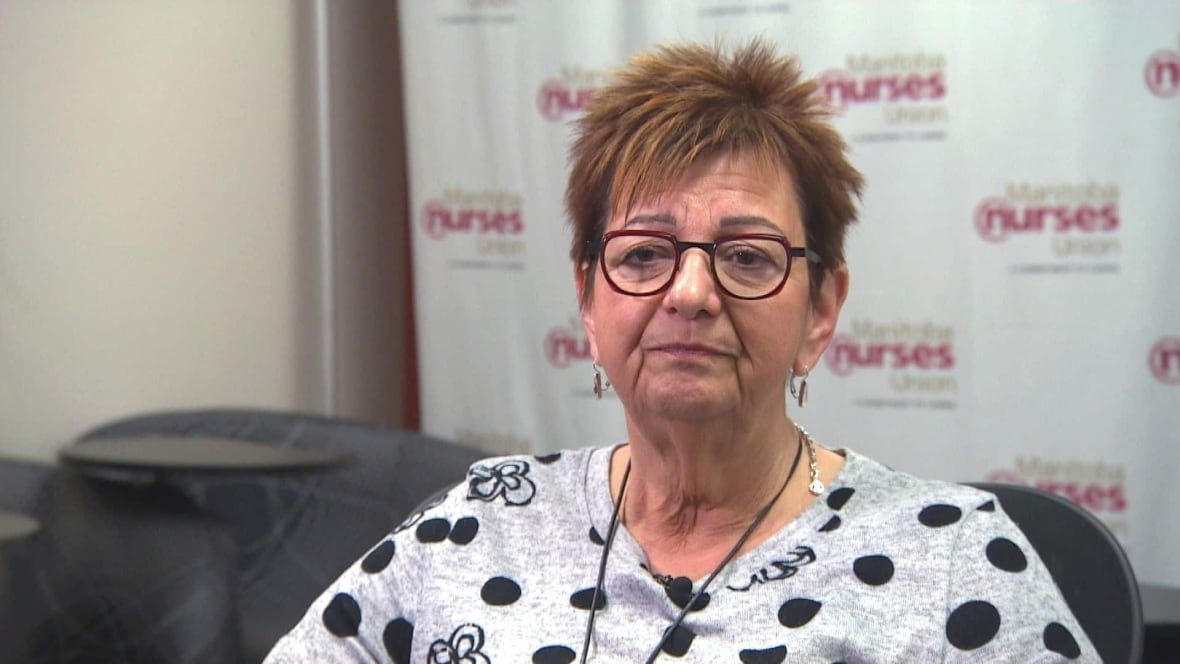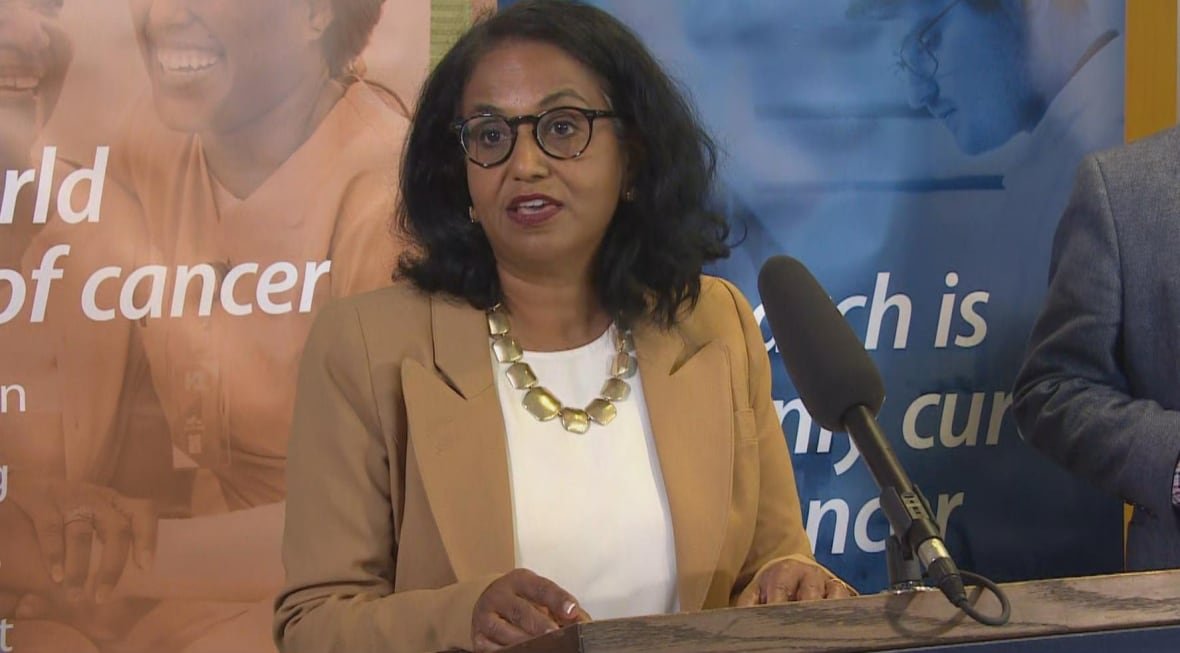Following a damning report from Doctors Manitoba, documents obtained by CBC reveal nurses and allied health workers at CancerCare Manitoba have been trying to highlight concerns about dangerously low staffing at the provincial cancer agency since last January.
A letter from the Manitoba Nurses Union local that represents the estimated 300 nurses within the agency’s clinical departments was sent on Jan. 17 to CancerCare senior leadership, appealing for help with the staffing crunch.
“[We] are hereby bringing forward our concerns regarding difficulties with nurse retention, particularly clinical numbers. This has led to vacancies in some clinical departments greater than 50 per cent of their baseline staffing requirements,” the letter said.
Workload staffing reports — a type of union reporting document — jumped to “record high levels in all clinic areas,” the letter said.
More than 75 of those reports, which the letter says are intended to document that a nurse has “drawn management’s attention to an unsafe, or potentially unsafe, environment, were sent to the cancer agency in 2023. That’s a 400 per cent jump from 15 the year prior.
The letter emphasized the urgency of addressing staffing issues in hematology, which it said had more heavy workload reports than all other clinical areas combined, while acknowledging other clinics within the agency are facing similar crises.

Jason Linklater, president of the Manitoba Association of Health Care Professionals, said Thursday that he’s been aware of staffing issues and workplace toxicity for multiple years.
“The difficulty is, as in this CancerCare circumstance, that those one-off incidents have become chronic issues throughout the system,” he said.
“Staffing shortages are the biggest contributor to these types of toxic workplace environments. There’s just no way to create workplace culture when there aren’t enough people doing the work.”
There are about 120 allied health workers employed at the provincial cancer agency, Linklater said, including radiation therapists, mammography technologists, psychosocial oncology clinicians and laboratory technicians.
Manitoba Nurses Union president Darlene Jackson said Thursday that staffing issues at CancerCare haven’t been addressed, despite calls for help and change from the people working there.
“The nurses do not feel as if they’re valued or respected,” she said.
“They are short-staffed, as is everyone in Manitoba, but they are finding that they’re just getting more and more and more work added to their plates every day, and to the point where they’re patient loads are unsustainable.”
CancerCare has taken several steps to address the concerns raised by its nurses since the January letter, including increasing staffing levels for specific disease-site groups and actively engaging with staff, according to a Thursday email from director of communications Twylla Krueger.
WATCH | Physicians describe toxic work culture at provincial cancer agency in internal report:
Burnt out and stressed out. That’s how some doctors who work for CancerCare Manitoba are feeling according to a report obtained by CBC. The findings come from feedback given by physicians who work with the organization.
Like a report from Doctors Manitoba that came to light this week and also called out the crisis conditions at CancerCare, nurses have also seen a revolving door of staff coming and going, according to the Jan. 17 letter.
Only one in 10 nurses at one site had more than nine months of hematology experience in January, it said.
“CancerCare is relying on registered nurse burnout to maintain high standards of patient care, thus squandering one of their best assets, the expertise of seasoned nurses,” the letter said.
According to data from the agency, the overall nurse vacancy at the agency is 7.3 per cent, as of September.
CancerCare response ‘incredibly tone deaf’: MNU
CancerCare responded to that letter with one of its own to the union local in March.
In the March 20 letter, CancerCare chair Jeoff Chipman wrote the board understood the gravity and the “urgency of the situation,” and said the agency was committed to addressing the challenges “swiftly and effectively.”

But Jackson doesn’t believe the board is doing enough quickly enough.
“The entire tone of the organization comes from the very top and rolls down right,” she said. “There is a culture of lack of respect, lack of value, lack of collaboration with nurses, and clearly with physicians, because they’ve spoken out also.”
Linklater agreed.
“We’ve been flagging this for years, and it’s that top-down management approach that’s tone deaf, disrespectful and ignores input from staff, and I think they will continue to lose people until that’s dealt with,” he said.
After the report from Doctors Manitoba was sent to CancerCare, Chipman said in a second letter that the agency is committed to addressing workplace culture concerns, noting there are “significant challenges” tied to workload, burnout and retention of physicians.
Dr. Sri Navaratnam, the agency’s president and chief executive officer, sent two emails, obtained by CBC, in response to the Doctors Manitoba report — one on Monday and another Wednesday, after the report had become public through media reports.
Navaratnam said she found it “troubling” that physicians are unhappy.
“I regret that you are exposed to this negative commentary about our organization,” Navaratnam said in the Wednesday email, adding that she takes the report’s allegations “very seriously.”
Jackson isn’t convinced.
“The negative commentary is not coming from anyone outside the organization. It’s coming from the staff,” she said.
“So I find that incredibly tone deaf. Your staff have been asking for help, they’ve been talking about issues, and it has not been dealt with.”

Jackson wonders if a change at the top of CancerCare sooner than later might be best. Navaratnam is stepping down once her contract expires next December.
“I think the board needs to really sit up and take notice of what’s happening in that organization and start to give some direction on dealing with it,” Jackson said.
CancerCare’s Krueger said the board is actively working on a succession plan for the CEO position, which is expected to be filled some time next year.
Linklater is optimistic there will be changes sooner than later.
“I hope that government is paying attention,” he said.
“I hope leaders are implemented at all the different levels of management that have vision and care about staff, and are willing to make changes that improve retention, cause there to be recruitment and ultimately dispose of that toxic workplace environment.”
Even though she considers the agency an environment “that is not desirable to work in,” Jackson maintains patients shouldn’t be concerned about going to CancerCare.
“For patients, it’s still a great place to go. The staff are amazing,” she said. “However, there are definitely problems in that system.”
Manitoba Health Minister Uzoma Asagwara said in an emailed statement to CBC that patient care will not be affected despite staffing concerns.
The province “will continue to listen and learn from” workers on the front line, they said.
Nurses warned CancerCare Manitoba about dangerous staffing levels and called for change nearly a year ago. Documents obtained by CBC reveal nurses have been trying to highlight concerns about dangerously low staffing at the provincial agency since last January.



